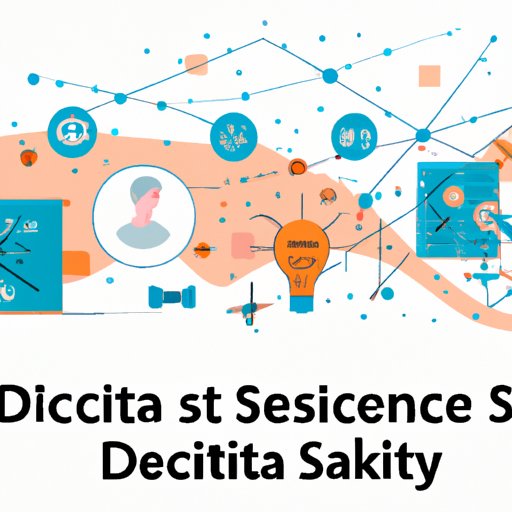Introduction
The field of data science is growing rapidly, and demand for data scientists is increasing. With the right knowledge and experience, anyone can become a data scientist. This article will provide an overview of the skills needed to get started in data science and the steps you can take to make yourself an attractive candidate for potential employers.
Research Data Science and the Skills Required
Before you start your journey into data science, it’s important to understand what it is and the skills required to be successful. Data science is the study of how data is collected, organized, analyzed, and interpreted to solve problems and gain insights. It involves using various techniques such as machine learning, artificial intelligence, statistical analysis, and data mining to extract useful information from large datasets.
To become a data scientist, you must possess a variety of technical and soft skills. Technical skills include programming languages such as Python and R, database management, and statistics. Soft skills include problem-solving, communication, and creativity. Additionally, data scientists must have a deep understanding of the business or industry they are working in to ensure their solutions are relevant and effective.

Take Online Courses or Attend Boot Camps
Once you have a basic understanding of data science, you can begin taking online courses or attending boot camps to further develop your skills and knowledge. There are many different types of courses available, ranging from introductory to advanced levels. You can also choose to specialize in specific areas such as machine learning or natural language processing.
When deciding which type of course is right for you, consider your learning style and goals. Do you prefer self-paced learning or do you need the structure of an instructor-led course? Are you looking to develop a broad understanding of data science or do you want to focus on a particular area? Knowing the answers to these questions will help you find the course that best fits your needs.
In addition to taking courses, attending boot camps can be a great way to gain practical experience in data science. Boot camps typically offer hands-on projects and workshops that allow you to apply your knowledge and hone your skills. Many boot camps also provide job placement assistance, which can be helpful if you’re looking for a job in the field.
Network With Professionals Already in the Field
Networking is an essential part of any career path, and data science is no exception. Connecting with professionals already in the field can be a great way to learn more about the industry and gain valuable insight into potential job opportunities. Social media platforms like LinkedIn and Twitter are excellent places to start.
You can also attend conferences and networking events to meet other data scientists and industry professionals. These events provide an opportunity to exchange ideas and discuss current trends in the field. Additionally, don’t be afraid to reach out to colleagues and mentors who can provide guidance and advice.
Create Portfolios of Your Work
Creating a portfolio of your work is a great way to showcase your skills and experience to potential employers. When compiling your portfolio, select projects that demonstrate your technical abilities and show off your unique skills. Choose an appropriate platform to host your portfolio, such as GitHub or a personal website, and make sure to keep it up to date with your latest work.
Your portfolio should also include a summary of each project, outlining the objectives, approach, results, and any challenges you faced. This will give employers an idea of your capabilities and how you can contribute to their team.

Pursue Internships or Volunteer Opportunities
Internships and volunteer opportunities are excellent ways to gain hands-on experience in data science. Research companies and organizations that offer internships or volunteer positions related to data science and explore the different types of opportunities available. Working in an internship or volunteer role can provide valuable on-the-job training and increase your chances of getting a full-time job in the field.

Stay Up to Date on Industry Trends and New Technologies
Data science is a rapidly changing field and keeping up with industry trends and new technologies is essential. Follow publications such as The Data Science Report and KDnuggets to stay abreast of the latest developments. Additionally, join professional organizations like the International Association for Data Science and participate in online discussions to connect with other data scientists.
Conclusion
Getting started in data science requires a combination of research, hard work, and dedication. Understanding the skills and qualifications needed, taking courses or attending boot camps, networking with professionals in the field, creating portfolios of your work, and staying up to date on industry trends and new technologies will help you make yourself a competitive candidate for potential employers.
We hope this guide has provided you with the resources and strategies you need to get started in data science.
(Note: Is this article not meeting your expectations? Do you have knowledge or insights to share? Unlock new opportunities and expand your reach by joining our authors team. Click Registration to join us and share your expertise with our readers.)
